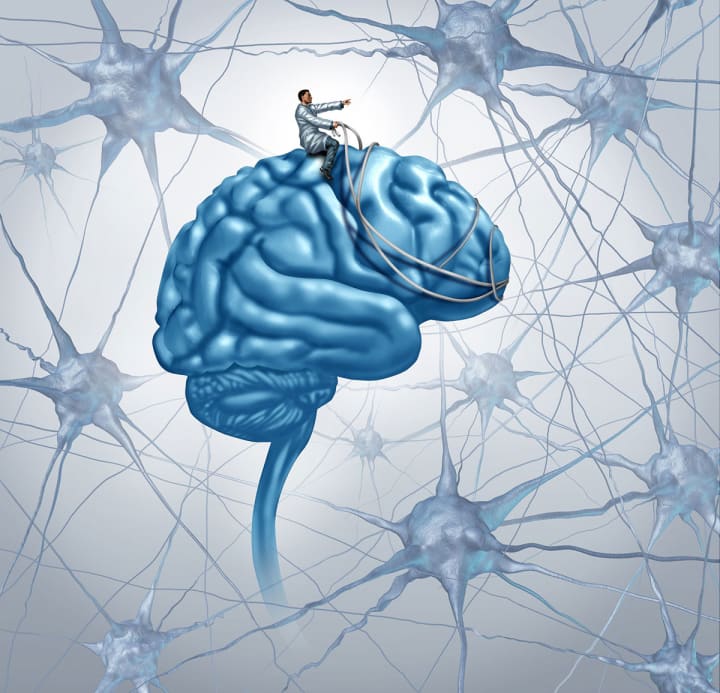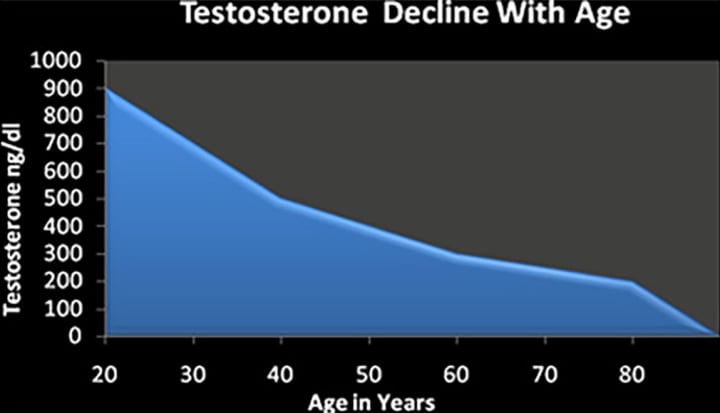Male Menopause May Be Psychological
Are we old or is it all in our head? Male Menopause may be psychological.

Men's sexual aging is far more mysterious than women's. When women look down the sexual road, at least one thing is clear: menopause. They know that if their sexual instincts, responses, and appetites start to go a bit haywire anytime from their late thirties on, there's probably a biochemical explanation. However there's also light at the end of tunnel. Men don’t have that same assurance. If their sexual responses turn less than trustworthy from around 40-years-old on, the possible causes seem endless. Maybe it's the toll of endless job stress, or a latent sexual identity crisis, or some disastrous hormonal disorder. Maybe it's male menopause, if such a thing exists. Like women, men's hormones do fluctuate with age. Despite the testicle's ability to resist aging, a majority of men experience a decrease in testosterone after age forty. Which also begs the question - How do I deal with sexual anxiety?
Decline in Sex Drive: Psychological or Physical

What might be the consequences of that drop-off? Three aspects of male sexuality might be affected: potency, the ability to produce an erection and have intercourse, fertility, the ability to produce enough sperm to make a man's partner pregnant, and libido, the desire to have sex. While many men experience changes in at least one of these departments, how many of these age-related changes are due to the fall in testosterone and how much is a matter of psychology? A study at Yale University was revealing: among older couples seeking counseling for sexual problems, 60 percent of the male partners who began with sexual problems, or saw their problems get noticeably worse, experienced these troubles while their wives were going through menopause.
Vaginal dryness and the fear of causing pain, feelings of rejection, postmenopausal bleeding, even anger and frustration were given as reasons for potency problems and a reduced interest in sex. It's easy enough for a man to blame his sexual problems on his partner-a clear indication that desire is usually more psychologically than physiologically driven. Underscoring that fact are nonsexual realities that men begin to face in middle age: physical weakness, fear of illness, insecurity about their status at work, threats from eager and more youthful competitors, fear of getting old, forced retirement, the sadness and despair of lost opportunities. These blows to a man's stability, ego, and social standing may strike at the core of his male identity and reverberate into the sexual sphere.
Indeed, it becomes increasingly clear that psychological attitudes determine the male libido more than any other factor. Is the male menopause largely a myth? Some men do experience what could be loosely called a menopause due to a dramatic fall in their sex hormones, but these are few. In most men there is a more gradual decline in testosterone over many years, which may or may not be responsible for the acknowledged fall many of them experience in sexual activity. Ill health, alcohol problems, medicines, and psychological problems all have damaging effects on this delicate process. Today, psychiatric counseling, hormone treatment, and the use of new surgical techniques all mean that men no longer have to sacrifice their sexuality to the rigors of old age.
Male Menopause

In looking for signs of a male menopause, scientists have zeroed in on the delicate balance of a man's reproductive system. Just as estrogen is the chemical key to femininity (and the hormones that dwindle during menopause), testosterone is the sex hormone that switches a man's organs, including his brain, into the masculine mode. For 20 to 30 years, the testicles inject into the bloodstream enough testosterone day and night to sustain men's procreational pursuits during their reproductive years. The testicles are not alone in this activity.
They are commanded by the pituitary, a pea-sized gland at the base of the brain, which responds in turn to directions from the brain itself. The pituitary's signals are hormonal: in men, lutenizing hormone (LH) controls the testicles' production of testosterone. When testosterone levels in the blood begin to drop, more LH is released by the pituitary hormone, follicle-stimulating hormone (FSH), is responsible for maintaining sperm production within the testicles. Fortunately, many believe a good testosterone booster can subside the affects of aging and aid Gonadotropin-releasing hormone (GnRH) which regulates LH and FSH.
What about sex itself-how does sexual function change with age? There are no reports of shrinkage of the erect sexual organ with age, but most men can attest to ejaculation being less likely to occur at the slightest provocation. A German study in 1983 found that the threshold at which a man perceives vibrations to the head of his penis generally increases with age. The force of ejaculation declines with age. What's less substantiated is that the testicles shrink or that the angle at which the penis stands when fully erect falls as the years go by. However, it does take longer for men to get an erection as they get older, and once it reaches the horizontal, it takes very little distraction to make it droop. Orgasms, when they happen, may be less intense, but in general, sexual intimacy loses none of its pleasure. So it seems that while men experience many menopausal symptoms, their sexual decline is dependent on the type of person and they have the potential fertility, potency, and a high libido late into life.
Life Expectancy of Testicles

Some researchers believe that the testicles gear down because the circulatory system carrying their blood supply gets sluggish with old age or becomes damaged. Others theorize that the male body begins to perceive the testicles as foreign and sends squadrons of antibodies to attack and weaken them. However, a number of menopause researchers have noted that if they exclude men who are chronically ill, have psychiatric problems, or who are taking drugs from their studies, even in advanced age the testicles continue to do their job almost as well as they did in their youth. In fact, it seems that the testicles have an impressive ability to resist the ravages of old age.
A decreased libido in men is usually easier to cope with than when it affects a woman. Usually, men’s sex drives will be tied to biology, such as a decrease in testosterone, which makes it easier to treat through medication or natural vitamins, such as zinc. Men have embraced drugs as a cure for erectile dysfunction but also for a decreasing libido. With women, the search for a sex drive enhancing drug is much harder to find. Only very recently has the female version of Viagra been available on the market for women we are experiencing difficulties.
There are lifestyle factors that can lead to a lowered sex drive, such as chronic illness, side effects from medications, depression, sleep problems, and of course, aging. But there are remedies when experiencing low libido. The first step is to determine the cause. Talking with a doctor about a treatment option is a good place to start. They will be able to determine whether or not the decrease in sex drive is due to medical or psychological reasons. Next, make a conscious effort to reduce the stress in your life. Everyday worries about children, finances, and relationships can cause anxiety and diminish self-esteem which can directly effect the libido. It is also important to make an effort to rekindle the relationship you are in. Problems in the bedroom can directly relate to a decrease in libido. An effort by both partners to face the issues and make lifestyle adjustments may be the solution to any problems.
About the Creator
David McCleary
Holistic health practitioner. Believes in using natural remedies over traditional medications whenever possible. Volunteers at a recycling plant.






Comments
There are no comments for this story
Be the first to respond and start the conversation.